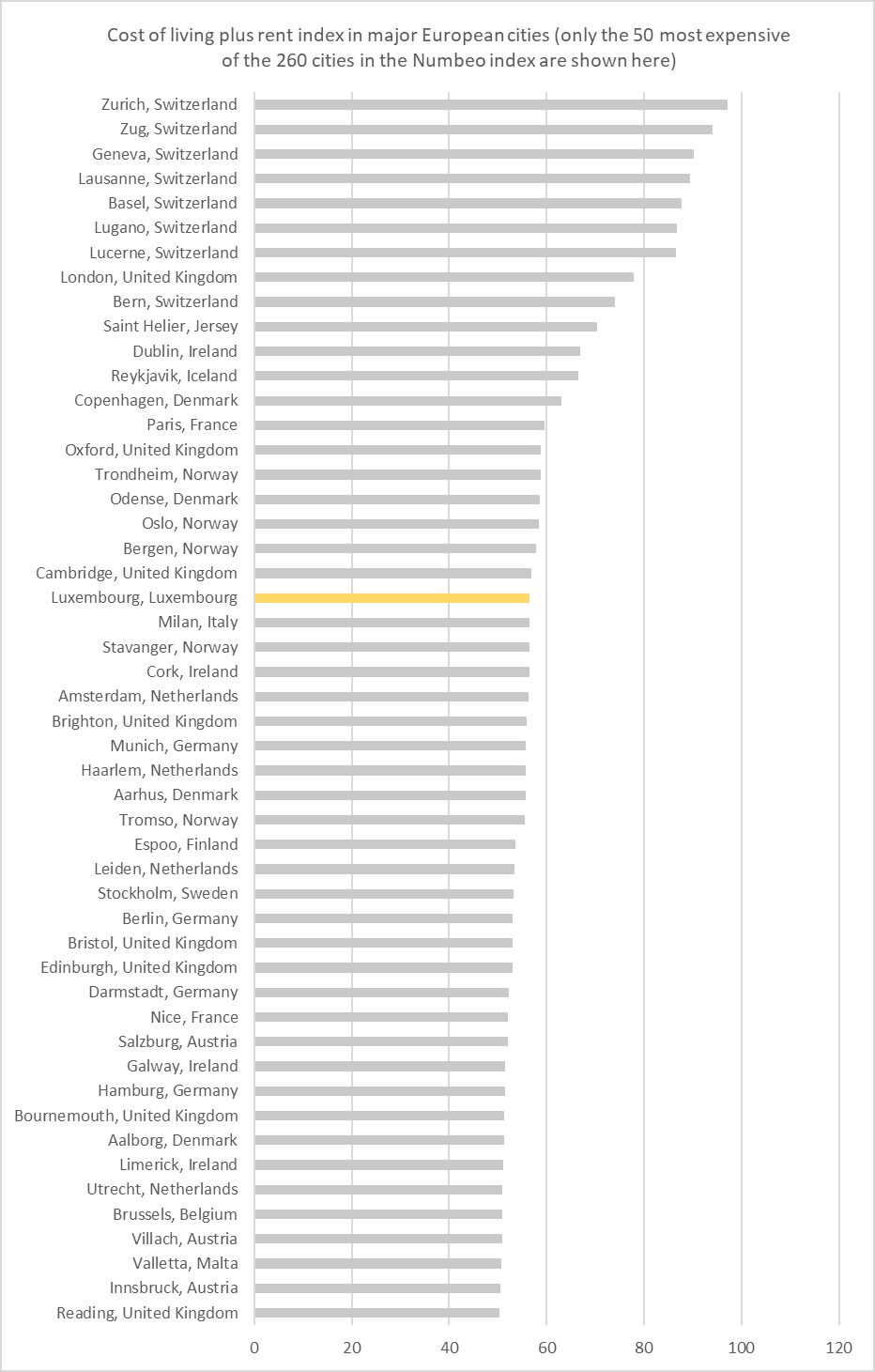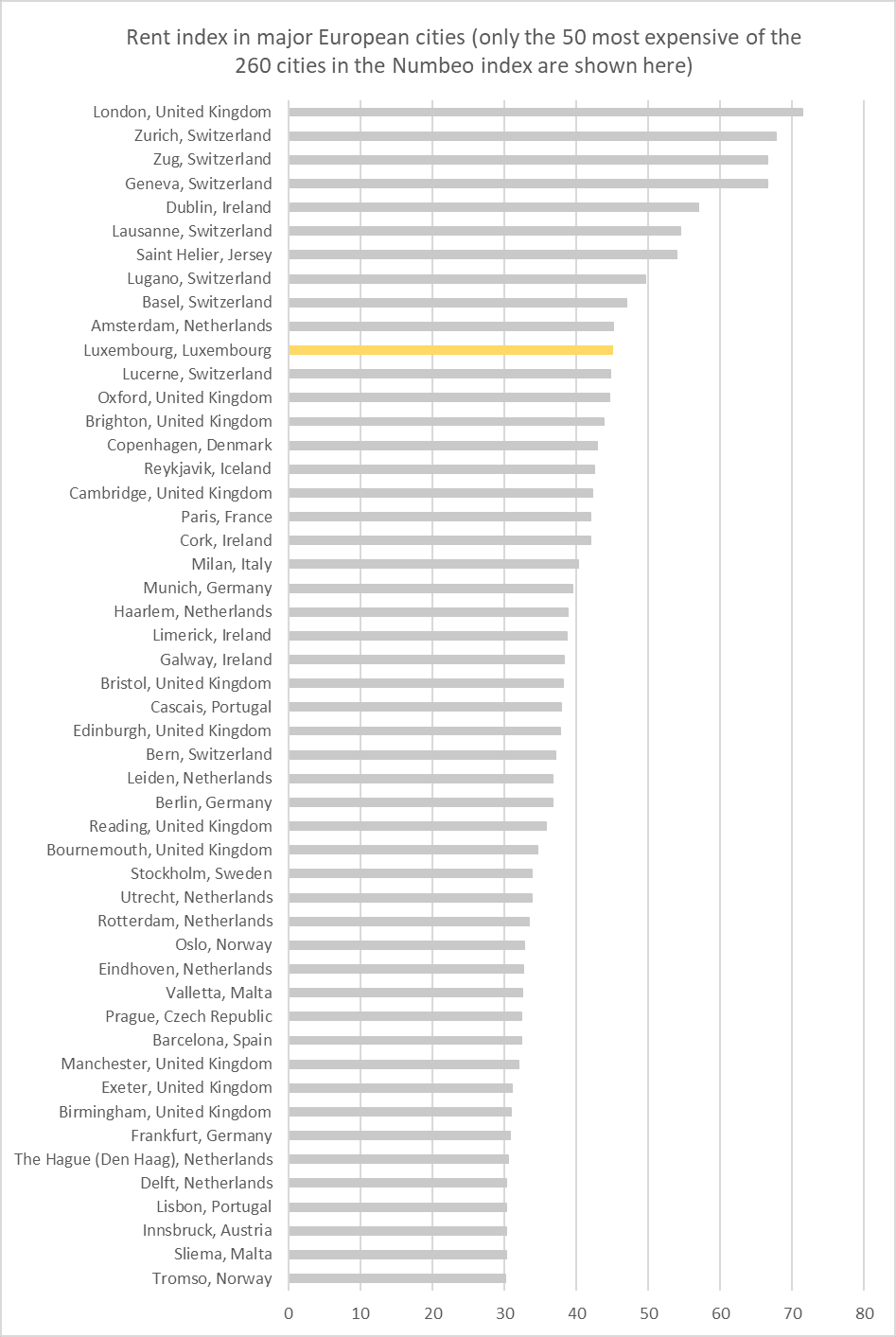
Cost of living for students in Luxembourg
In this comprehensive article, we will get an in-depth look and compare Luxembourg's cost of living with other European cities, explore tuition fees, examine student accommodation expenses, and discuss grocery costs.
Luxembourg, known for its robust economy and low unemployment, is an appealing choice for many. Yet, its high living standards, while balanced by salaries above the European average, present a substantial challenge for students, particularly international students. There are many newcomers from India, Pakistan, Nigeria, Ukraine and other countries, aongside the European Union students.
This predicament might be a contributing factor to Luxembourg attracting a relatively modest number of international students. In 2022, a mere 633 foreign students migrated to Luxembourg, placing the country towards the bottom of the list concerning student immigration within the European Union. Despite these challenges, the influx of students to the Grand Duchy grows annually. Understanding the cost of living is crucial for prospective students to adequately plan their academic pursuits.
Read our article
Luxembourg's cost of living compared to other European cities
Understanding the extent of the high cost of living in Luxembourg becomes more tangible when viewed through reference indices. Numbeo, offering the world's most extensive cost-of-living database, provides valuable insights and indexes for a clearer perspective.
Among Numbeo's comprehensive indices is the "Cost of Living Plus Rent Index," which evaluates consumer goods prices, including rent, in comparison to New York City. With this index, a city with a Cost-of-Living Index of 120 is estimated to be 20% more expensive than New York City.
Paris in France, United Kingdom megapolises, Iceland, Denmark and Norwegian cities, and Milan in Italy also precede Luxembourg.

Cost of living in Luxembourg for international students
With a broader understanding of the landscape, let's take a deeper look into the intricacies of living costs for international students in Luxembourg. Our exploration will span tuition fees, accommodation expenses, food costs, healthcare, and miscellaneous expenditures, offering a comprehensive guide to help students plan their academic journey in this prosperous nation.
Tuition fees for education programs
Luxembourg boasts a single public university, the University of Luxembourg, recognized for its economic affordability. While universities have the autonomy to set tuition fees for non-European students, the University of Luxembourg remains notably moderate while being sponsored by the government.
University of Luxembourg fees typically range from
200 to 450 euros per semester
Private universities tend to have higher tuition fees range from
6,000 to 12,000 euros per year

Fortunately, Luxembourg extends support to international students through scholarships and financial aid . Various universities and organizations offer diverse scholarship programs, addressing tuition and maintenance costs. These scholarships may be merit-based, need-based, or specific to particular fields of study. Prospective students are encouraged to explore official university websites, government initiatives, and external organizations to identify suitable scholarship opportunities.
Read the article
Cost of student accommodation in Luxembourg
When assessing the cost of living for students in Luxembourg, accommodation emerges as a pivotal factor, notably high even for those earning a Luxembourgish salary.
Luxembourg ranks among the top 5% of the most expensive cities for housing
11th place in Numbeo's Rent Index on a European scale
Even more expensive in terms of accomodation prices in Europe are
Amsterdam and London, cities of Switzerland and Ireland
But what are the actual figures?
For students opting for a private apartment, monthly expenses range from 800 to 1600 euros. Collaborative living in 2 or 3-bedroom flats with fellow students offers a potential cost-saving alternative. Specialized options for students also exist, with universities typically providing more affordable student residences ranging from 350 to 700 euros per month.

Grocery costs in Luxembourg
In the realm of food expenses, Luxembourg positions itself at 36th when compared to other countries in Numbeo's index. While an improvement from other indices, it still remains relatively high on the list.
Typically, students allocate a monthly budget of 250 to 350 euros for groceries. However, your dietary preferences play a pivotal role in determining your actual spending. Opting for a health-conscious diet with organic products, albeit pricier, may surpass the mentioned 350 euros. Conversely, embracing a more traditional and budget-friendly student diet, often centered around pasta, can keep expenses below the 250-euro mark.
Health care costs in Luxembourg for students
Luxembourg boasts a world-renowned healthcare system, a testament to the government's substantial investment in managing, maintaining, and enhancing healthcare infrastructure. The costs can vary based on your country of origin due to existing agreements between Luxembourg and other nations regarding social security.
In cases where no such agreement exists, the monthly enrollment cost in the student social security system is 33 euros. For detailed and up-to-date information, it is advisable to refer to the dedicated government page on Healthcare for students at guichet.lu.
Read the article
General overview of living costs for students in Luxembourg
Luxembourg offers a student-friendly environment with a notable perk—free transportation. As a student, you won't incur any costs in this regard. However, miscellaneous expenses, not covered here, may require an additional budget of approximately 100 euros per month.
In summary, the monthly expenses range from a lower threshold of around 750 euros to an upper limit of approximately 1800 euros. The table below breaks down these costs.
| Category | Lower limit (€) | Upper limit (€) |
| Accommodation | 350 | 1200 |
| Food | 250 | 350 |
| Health | 33 | 130 |
| Transport | 0 | 0 |
| Other expenses | 100 | 200 |
| Total cost | 733 | 1880 |
Why transport is free in Luxembourg?
Yes, that is true. All public transport in the counrty is free of charge. Read more about the case and find out the details in our dedicated article.
Working opportunities as a student in Luxembourg
If you're wondering about the feasibility of working in Luxembourg as an international student, the student residence permit comes with the advantage of allowing employment under certain conditions.
Students can work a maximum of 15 hours per week on average during a one-month period, with exceptions for paid work during school holidays, research roles at higher education institutions or authorized research entities contributing to a Ph.D., and contracts for assistants at the University of Luxembourg. This flexibility enhances students' financial options, enabling them to gain valuable work experience while pursuing their academic goals in Luxembourg.
Read the article
Frequently Asked Questions (FAQ)
What is the average cost of student accommodation in Luxembourg?
The average cost of student accommodation in Luxembourg varies depending on factors such as location and housing type. Generally, students opting for private apartments may spend between 600 and 1200 euros per month. Alternatively, universities often offer more affordable options, with student residences ranging from 350 to 700 euros monthly.
Is there any public transportation cost for students in Luxembourg?
No, Luxembourg offers free public transportation for students, residents and tourists, eliminating any associated costs. This includes buses, trams, and trains, providing students with convenient and cost-effective commuting options throughout the country.
What is the typical monthly grocery cost for students in Luxembourg?
Students in Luxembourg typically allocate a monthly budget of 250 to 350 euros for groceries. However, individual dietary choices play a significant role in determining the actual expenditure. Opting for healthier or organic options may slightly increase costs, while a more traditional student diet centered around budget-friendly staples can keep expenses lower.
Are there affordable alternatives to private accommodation for students in Luxembourg?
Yes, students in Luxembourg have access to more budget-friendly accommodation alternatives. University-provided student residences offer cost-effective options, ranging from 350 to 700 euros per month. Additionally, sharing apartments with fellow students is a common practice, further reducing accommodation expenses and providing a sense of community.
Source: www.educations.com, ask-scholars.com, www.numbeo.com, guichet.public.lu, www.studentum.fr
We took photos from these sources: Pexels; uni.lu